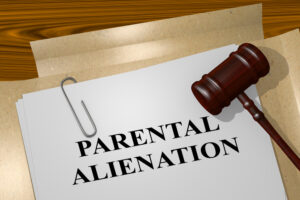Morristown Parental Alienation Attorneys: Are you being undermined?
Parental alienation is the often silent and ugly hidden face of divorce. Put plainly; parental alienation is when one parent consciously or unconsciously undermines and interferes with a child’s relationships with the other parent.
 Some of the most common examples that define parental alienation are one parent attempting to hinder the other parent’s visitation by refusing to follow a custody schedule, intentionally scheduling activities for the children during the other parent’s time, discussing the divorce case with the children and disparaging the other parent in front of the children. However, parental alienation is often more complicated than simple obstruction of visitation and can manifest in many forms, including:
Some of the most common examples that define parental alienation are one parent attempting to hinder the other parent’s visitation by refusing to follow a custody schedule, intentionally scheduling activities for the children during the other parent’s time, discussing the divorce case with the children and disparaging the other parent in front of the children. However, parental alienation is often more complicated than simple obstruction of visitation and can manifest in many forms, including:
A Campaign of Denigration
Alienated children may come to be consumed with hatred of the targeted parent. This hatred may cause them to deny or forget any positive past experiences leading to rejection of all contact and communication. Parents who were once loved and valued seemingly overnight become hated and feared.
Reflexive and Unwavering Support for the Alienating Parent in Parental Conflict
When it comes to any family conflict, the alienated child will always side with the alienating parent, regardless of how absurd or baseless that parent’s position may be. There often isn’t any will or attempt to be impartial when faced with inter-parental conflicts. Children with parental alienation syndrome have no interest in hearing the targeted parent’s point of view.
Rejection of Extended Family
The hatred of the targeted parent may spread to his or her extended family. Thus, not only is the targeted parent denigrated, despised, and avoided but so too are their extended family. Often beloved grandparents, aunts, uncles, and cousins may suddenly be completely avoided and rejected. This constitutes one of the clearest signs that parental alienation is occurring.
Frivolous and Absurd Rationalizations

Lack of Ambivalence about the Alienating Parent
Alienated children may exhibit a lack of ambivalence about the alienating parent, demonstrating an automatic, reflexive, idealized support. That parent is perceived as perfect, while the other is perceived as generally bad, often without specifics. If an alienated child is asked to identify just one negative aspect of the alienating parent, he or she will often be unable to articulate their reasoning clearly.
The “Independent Thinker” Phenomenon
Though the alienating parent will unduly negatively influence alienated children, they will usually insist that the decision to reject the targeted parent is completely theirs alone. However, this is usually not the case and becomes clear when asked about the reason for their negative feeling toward the alienated parent.
A study by (Baker & Darnall, 2007) found that targeted parents rated their children as experiencing several of the above mentioned behavioral manifestations. Parents reported that their children exhibited one or more of these behaviors with a high degree of frequency. One exception was alienated children being able to maintain a relationship with some members of the targeted parent’s extended family, which occurred when that relative was actually aligned with the alienating parent.

One of the largest studies into the prevalence of parental alienation was conducted by Clawar and Rivlin (1991) and covered a 12 year period. It found that in 86% of the 1000 cases they studied, there was some level of parental programming and brainwashing to implant false and negative ideas about the other parent to turn the child against that other parent.
Using the law to Combat Parental Alienation
New Jersey now identifies and addresses custody cases involving parental alienation with a much greater understanding of the long-lasting impacts it can have on a child’s welfare. As a result and thankfully, there are many more legal avenues to combat this type of emotional abuse.
In determining the best interest of the children in matters of custody, courts look at many factors, including which parent is more likely to encourage and permit frequent and continuing contact with the other parent, the attempts of a parent to turn the child against the other parent in addition to the level of conflict between the parents and the ability of the parents to cooperate.
Science has long since proven that it is always in the child’s best interests to maintain a healthy and strong relationship with both parents. Though divorce is complicated for any family, parents need to realize their actions and words on their children. It is important not to put each other down in front of the children or let one parent prevent the other parent from spending quality time with the children when they are obviously loving and supportive.
Modern family law courts are very in tune with parental alienation issues and have the ability to issue certain remedies, including ordering reunification therapy and modifying the custody order.

- Scheduling an interview with the judge. In most cases, it is possible to request that the judge interview a child in private. This allows the judge to converse with the child in a friendly fashion.
- Working with a child custody evaluator. It is also possible to enlist an expert to perform a forensic evaluation of your child custody situation. An expert evaluator will conduct interviews of the parents and the child and possibly conduct psychological testing on all parties involved to discover any issues. The expert can then issue a written report to the court with their findings.
When it comes to fighting parental alienation and preserving time with your children, you will need the expertise of a qualified and experienced family law attorney. It is critical not to take on these issues alone.
Contact our Madison, NJ Family Law and Parental Alienation for a Virtual Consultation
At Jacobs Berger, LLC, our family law attorneys’ team fiercely supports our clients across Randolph, Madison, Tewksbury, Florham Park, Morristown, and the greater Morris County area in ensuring that their parenting time is preserved and protected.
To schedule a confidential case assessment regarding your family law issue, please contact us online or call our Morristown, NJ office by dialing (973) 710-4366 today.




